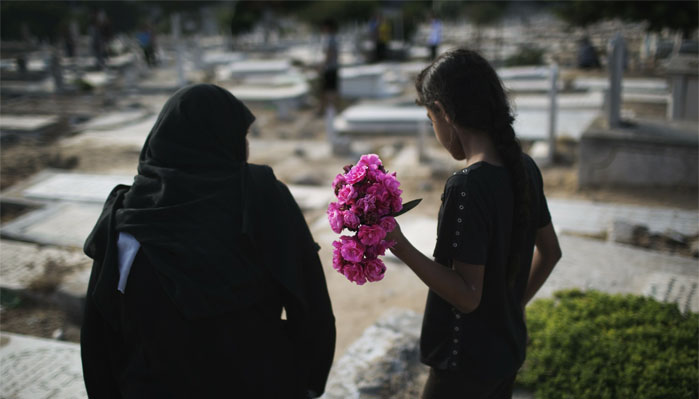A Palestinian woman and a girl carry flowers to a family grave on Eid al-Fitr at a cemetery in Gaza City
Reuters/Gaza/Jerusalem
Israel's military pounded targets in the Gaza Strip on Tuesday after Prime Minister Benjamin Netanyahu said his country needed to be prepared for a long conflict in the Palestinian enclave, squashing any hopes of a swift end to 22 days of fighting.
Israeli aircraft fired a missile at the house of Hamas Gaza leader Ismail Haniyeh before dawn on Tuesday, causing damage but no casualties, Gaza's interior ministry said.
An Israeli military spokeswoman had no information on the report but was checking for details.
Eleven people were killed in a strike on a house in the Bureij refugee camp in Gaza City as Israeli forces hit targets across the territory in the most widespread night of attacks so far in the coastal enclave.
The military said five soldiers had died in a gun battle with militants who crossed into Israel via a tunnel near the community of Nahal Oz, close to the border with the Gaza Strip.
The incident on Monday raised to 10 the number of military fatalities for the day. Fifty-three Israeli soldiers have been killed since Israel launched its offensive on Gaza.
Hamas said that its broadcast outlets, Al-Aqsa TV and Al-Aqsa Radio were also targeted. The television station continued to broadcast, but the radio station went silent.
Israel launched its offensive on July 8 with the aim of halting rocket attacks by Hamas and its allies. It later ordered a land invasion to find and destroy the warren of Hamas tunnels that criss-crosses the border area.
In a televised address on Monday night, a grim-faced Netanyahu said any solution to the crisis would require the demilitarisation of the Palestinian territory, controlled by Hamas Islamists and their militant allies.
"We will not finish the mission, we will not finish the operation without neutralising the tunnels, which have the sole purpose of destroying our citizens, killing our children," Netanyahu said, adding that it had been a "painful day".
An opinion poll broadcast by Israel's Channel 10 television showed overwhelming public support for continuing the Gaza offensive until Hamas is "disarmed".
As night fell, army flares illuminated the sky and the sound of intense shelling was heard. The military warned thousands of Palestinians to flee their homes around Gaza City - usually the prelude to major army strikes.
"We need to be prepared for a protracted campaign. We will continue to act with force and discretion until our mission is accomplished," Netanyahu said.
A number of rockets fired from Gaza were launched toward southern and central Israel, including the Tel Aviv area. At least one rocket was intercepted by the Iron Dome system. No casualties or damage were reported.
Some 1,087 Gazans, most of them civilians, have died in the 22-day-old conflagration. As well as the 53 soldiers killed, three civilians have died as a result of Palestinian shelling.
The explosion of violence, after a day of relative calm on Sunday, appeared to wreck international hopes of turning a brief lull into a longer-term ceasefire.
Gaza's dominant Hamas Islamists said they had accepted a U.N. call for a pause in hostilities on Monday to coincide with Eid, which marks the end of the fasting month of Ramadan.
Israel initially baulked, having abandoned its own offer to extend a 12-hour truce from Saturday when Palestinian rockets kept flying. Calm gradually descended through the night with the occasional exchange of fire until a series of blasts shook Gaza in the afternoon.

